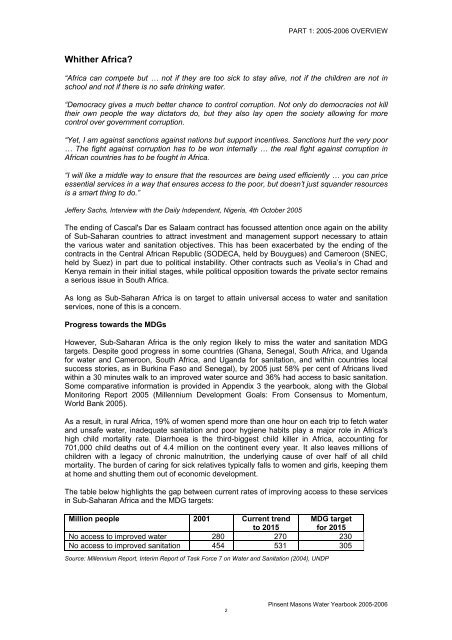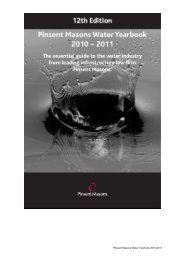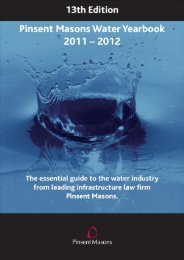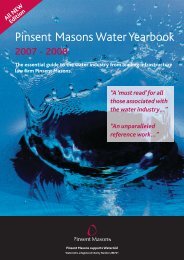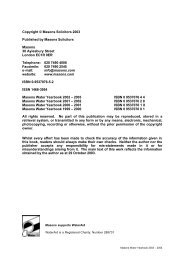- Page 1: Copyright © Pinsent Masons 2005 Pu
- Page 4 and 5: £2bn was achieved by increased eff
- Page 6 and 7: Dr David Lloyd Owen iv DR DAVID OWE
- Page 8 and 9: PINSENT MASONS WATER SECTOR GROUP F
- Page 10 and 11: viii CONTENTS DENMARK..............
- Page 12 and 13: x CONTENTS FRANCE BOUYGUES ........
- Page 14 and 15: Introduction A new direction for th
- Page 16 and 17: …while the real cost of conflict
- Page 18 and 19: How to use this book xv HOW TO USE
- Page 20 and 21: Russian Utility Systems (Russia) Re
- Page 24 and 25: PART 1: 2005-2006 OVERVIEW Currentl
- Page 26 and 27: PART 1: 2005-2006 OVERVIEW Poor inf
- Page 28 and 29: Does it matter? 7 PART 1: 2005-2006
- Page 30 and 31: China - Putting The Five Year Plans
- Page 32 and 33: Water tariffs, 2004 (RMB/m³) City
- Page 34 and 35: Country / Company People served Ope
- Page 36 and 37: Industrial Water Outsourcing 15 PAR
- Page 38 and 39: PART 1: 2005-2006 OVERVIEW services
- Page 40 and 41: … while costs depend on what you
- Page 42 and 43: Indicative annual spending ranges o
- Page 44 and 45: 23 PART 1: 2005-2006 OVERVIEW The P
- Page 46 and 47: 25 PART 1: 2005-2006 OVERVIEW [3] M
- Page 48 and 49: [5] Universal service provision in
- Page 50 and 51: [7] Bolivia: Low cost approaches in
- Page 52 and 53: …and companies that grow 31 PART
- Page 54 and 55: 33 PART 1: 2005-2006 OVERVIEW Count
- Page 56 and 57: PART 1: 2005-2006 OVERVIEW • Popu
- Page 58 and 59: Trends identified Number of contrac
- Page 60 and 61: PART 1: 2005-2006 OVERVIEW Beijing
- Page 62 and 63: 41 PART 1: 2005-2006 OVERVIEW Middl
- Page 64 and 65: PART 1: 2005-2006 OVERVIEW In 1999,
- Page 66 and 67: 45 PART 1: 2005-2006 OVERVIEW Malay
- Page 68 and 69: PART 1: 2005-2006 OVERVIEW Company
- Page 71: PART 2: COUNTRY ANALYSIS 49 Pinsent
- Page 74 and 75:
ALBANIA PART 2: COUNTRY ANALYSIS Fr
- Page 76 and 77:
ALGERIA PART 2: COUNTRY ANALYSIS Pr
- Page 78 and 79:
AUSTRIA PART 2: COUNTRY ANALYSIS Au
- Page 80 and 81:
AUSTRIA PART 2: COUNTRY ANALYSIS Pr
- Page 82 and 83:
BAHRAIN PART 2: COUNTRY ANALYSIS Ba
- Page 84 and 85:
BELGIUM PART 2: COUNTRY ANALYSIS Ur
- Page 86 and 87:
BULGARIA PART 2: COUNTRY ANALYSIS B
- Page 88 and 89:
BULGARIA PART 2: COUNTRY ANALYSIS G
- Page 90 and 91:
CAMEROON PART 2: COUNTRY ANALYSIS C
- Page 92 and 93:
CENTRAL AFRICAN REPUBLIC PART 2: CO
- Page 94 and 95:
CHAD PART 2: COUNTRY ANALYSIS Fresh
- Page 96 and 97:
COTE D'IVOIRE PART 2: COUNTRY ANALY
- Page 98 and 99:
CROATIA PART 2: COUNTRY ANALYSIS Cr
- Page 100 and 101:
CZECH REPUBLIC PART 2: COUNTRY ANAL
- Page 102 and 103:
CZECH REPUBLIC PART 2: COUNTRY ANAL
- Page 104 and 105:
DENMARK PART 2: COUNTRY ANALYSIS De
- Page 106 and 107:
EGYPT PART 2: COUNTRY ANALYSIS New
- Page 108 and 109:
EGYPT PART 2: COUNTRY ANALYSIS Conf
- Page 110 and 111:
ESTONIA PART 2: COUNTRY ANALYSIS Mu
- Page 112 and 113:
FINLAND PART 2: COUNTRY ANALYSIS Fi
- Page 114 and 115:
FRANCE PART 2: COUNTRY ANALYSIS Wat
- Page 116 and 117:
FRANCE PART 2: COUNTRY ANALYSIS Pri
- Page 118 and 119:
GABON PART 2: COUNTRY ANALYSIS Priv
- Page 120 and 121:
GERMANY PART 2: COUNTRY ANALYSIS In
- Page 122 and 123:
GERMANY PART 2: COUNTRY ANALYSIS Th
- Page 124 and 125:
GHANA PART 2: COUNTRY ANALYSIS Ghan
- Page 126 and 127:
GREECE PART 2: COUNTRY ANALYSIS Fre
- Page 128 and 129:
GUINEA PART 2: COUNTRY ANALYSIS Gui
- Page 130 and 131:
GUINEA-BISSAU PART 2: COUNTRY ANALY
- Page 132 and 133:
HUNGARY PART 2: COUNTRY ANALYSIS Pr
- Page 134 and 135:
IRAN PART 2: COUNTRY ANALYSIS Iran
- Page 136 and 137:
IRAQ PART 2: COUNTRY ANALYSIS When
- Page 138 and 139:
IRELAND PART 2: COUNTRY ANALYSIS Ur
- Page 140 and 141:
ISRAEL - PALESTINE PART 2: COUNTRY
- Page 142 and 143:
ISRAEL - PALESTINE PART 2: COUNTRY
- Page 144 and 145:
ITALY PART 2: COUNTRY ANALYSIS Ital
- Page 146 and 147:
ITALY PART 2: COUNTRY ANALYSIS Wate
- Page 148 and 149:
ITALY PART 2: COUNTRY ANALYSIS ATO
- Page 150 and 151:
JORDAN PART 2: COUNTRY ANALYSIS Jor
- Page 152 and 153:
KENYA PART 2: COUNTRY ANALYSIS Urba
- Page 154 and 155:
KUWAIT PART 2: COUNTRY ANALYSIS Kuw
- Page 156 and 157:
LATVIA PART 2: COUNTRY ANALYSIS Lat
- Page 158 and 159:
LESOTHO PART 2: COUNTRY ANALYSIS Le
- Page 160 and 161:
LITHUANIA PART 2: COUNTRY ANALYSIS
- Page 162 and 163:
MALAWI PART 2: COUNTRY ANALYSIS Mal
- Page 164 and 165:
MOROCCO PART 2: COUNTRY ANALYSIS Mo
- Page 166 and 167:
MOROCCO PART 2: COUNTRY ANALYSIS se
- Page 168 and 169:
MOZAMBIQUE PART 2: COUNTRY ANALYSIS
- Page 170 and 171:
NAMIBIA PART 2: COUNTRY ANALYSIS Na
- Page 172 and 173:
THE NETHERLANDS PART 2: COUNTRY ANA
- Page 174 and 175:
NIGER PART 2: COUNTRY ANALYSIS Nige
- Page 176 and 177:
NIGERIA PART 2: COUNTRY ANALYSIS Go
- Page 178 and 179:
NORWAY PART 2: COUNTRY ANALYSIS Nor
- Page 180 and 181:
OMAN PART 2: COUNTRY ANALYSIS Oman
- Page 182 and 183:
POLAND PART 2: COUNTRY ANALYSIS Riv
- Page 184 and 185:
POLAND PART 2: COUNTRY ANALYSIS pop
- Page 186 and 187:
PORTUGAL PART 2: COUNTRY ANALYSIS S
- Page 188 and 189:
QATAR PART 2: COUNTRY ANALYSIS Qata
- Page 190 and 191:
ROMANIA PART 2: COUNTRY ANALYSIS th
- Page 192 and 193:
THE RUSSIAN FEDERATION PART 2: COUN
- Page 194 and 195:
THE RUSSIAN FEDERATION PART 2: COUN
- Page 196 and 197:
SAUDI ARABIA PART 2: COUNTRY ANALYS
- Page 198 and 199:
SAUDI ARABIA PART 2: COUNTRY ANALYS
- Page 200 and 201:
SENEGAL PART 2: COUNTRY ANALYSIS Gr
- Page 202 and 203:
SLOVAKIA PART 2: COUNTRY ANALYSIS P
- Page 204 and 205:
SLOVENIA PART 2: COUNTRY ANALYSIS W
- Page 206 and 207:
SOUTH AFRICA PART 2: COUNTRY ANALYS
- Page 208 and 209:
SOUTH AFRICA PART 2: COUNTRY ANALYS
- Page 210 and 211:
SPAIN PART 2: COUNTRY ANALYSIS Urba
- Page 212 and 213:
SPAIN PART 2: COUNTRY ANALYSIS 1999
- Page 214 and 215:
SWEDEN PART 2: COUNTRY ANALYSIS are
- Page 216 and 217:
TANZANIA PART 2: COUNTRY ANALYSIS T
- Page 218 and 219:
TUNISIA PART 2: COUNTRY ANALYSIS Tu
- Page 220 and 221:
TURKEY PART 2: COUNTRY ANALYSIS Tur
- Page 222 and 223:
UGANDA PART 2: COUNTRY ANALYSIS Uga
- Page 224 and 225:
UGANDA PART 2: COUNTRY ANALYSIS Lon
- Page 226 and 227:
UNITED ARAB EMIRATES PART 2: COUNTR
- Page 228 and 229:
UNITED KINGDOM PART 2: COUNTRY ANAL
- Page 230 and 231:
UNITED KINGDOM PART 2: COUNTRY ANAL
- Page 232 and 233:
UNITED KINGDOM PART 2: COUNTRY ANAL
- Page 234 and 235:
YEMEN PART 2: COUNTRY ANALYSIS Yeme
- Page 237:
Part 3 (i): Company Analysis: Major
- Page 240 and 241:
FRANCE PART 3 (i): COMPANY ANALYSIS
- Page 242 and 243:
FRANCE PART 3 (i): COMPANY ANALYSIS
- Page 244 and 245:
FRANCE PART 3 (i): COMPANY ANALYSIS
- Page 246 and 247:
FRANCE PART 3 (i): COMPANY ANALYSIS
- Page 248 and 249:
FRANCE PART 3 (i): COMPANY ANALYSIS
- Page 250 and 251:
FRANCE PART 3 (i): COMPANY ANALYSIS
- Page 252 and 253:
FRANCE PART 3 (i): COMPANY ANALYSIS
- Page 254 and 255:
FRANCE PART 3 (i): COMPANY ANALYSIS
- Page 256 and 257:
FRANCE PART 3 (i): COMPANY ANALYSIS
- Page 258 and 259:
FRANCE PART 3 (i): COMPANY ANALYSIS
- Page 260 and 261:
FRANCE PART 3 (i): COMPANY ANALYSIS
- Page 262 and 263:
FRANCE PART 3 (i): COMPANY ANALYSIS
- Page 264 and 265:
FRANCE PART 3 (i): COMPANY ANALYSIS
- Page 266 and 267:
FRANCE PART 3 (i): COMPANY ANALYSIS
- Page 268 and 269:
FRANCE PART 3 (i): COMPANY ANALYSIS
- Page 270 and 271:
FRANCE PART 3 (i): COMPANY ANALYSIS
- Page 272 and 273:
FRANCE PART 3 (i): COMPANY ANALYSIS
- Page 274 and 275:
FRANCE PART 3 (i): COMPANY ANALYSIS
- Page 276 and 277:
FRANCE PART 3 (i): COMPANY ANALYSIS
- Page 278 and 279:
FRANCE PART 3 (i): COMPANY ANALYSIS
- Page 280 and 281:
GERMANY PART 3 (i): COMPANY ANALYSI
- Page 282 and 283:
GERMANY PART 3 (i): COMPANY ANALYSI
- Page 284 and 285:
GERMANY PART 3 (i): COMPANY ANALYSI
- Page 286 and 287:
GERMANY PART 3 (i): COMPANY ANALYSI
- Page 288 and 289:
GERMANY PART 3 (i): COMPANY ANALYSI
- Page 290 and 291:
GERMANY PART 3 (i): COMPANY ANALYSI
- Page 292 and 293:
ITALY PART 3 (i): COMPANY AN/ALYSIS
- Page 294 and 295:
ITALY PART 3 (i): COMPANY AN/ALYSIS
- Page 296 and 297:
SPAIN PART 3 (i): COMPANY ANALYSIS:
- Page 298 and 299:
SPAIN PART 3 (i): COMPANY ANALYSIS:
- Page 300 and 301:
SPAIN PART 3 (i): COMPANY ANALYSIS:
- Page 302 and 303:
UNITED KINGDOM PART 3 (i): COMPANY
- Page 304 and 305:
UNITED KINGDOM PART 3 (i): COMPANY
- Page 306 and 307:
UNITED KINGDOM PART 3 (i): COMPANY
- Page 308 and 309:
UNITED KINGDOM PART 3 (i): COMPANY
- Page 310 and 311:
UNITED KINGDOM PART 3 (i): COMPANY
- Page 313:
Part 3 (ii): Company Analysis: Loca
- Page 316 and 317:
AUSTRIA PART 3 (ii): COMPANY ANALYS
- Page 318 and 319:
AUSTRIA PART 3 (ii): COMPANY ANALYS
- Page 320 and 321:
BELGIUM PART 3 (ii): COMPANY ANALYS
- Page 322 and 323:
CZECH REPUBLIC PART 3 (ii): COMPANY
- Page 324 and 325:
FRANCE PART 3 (ii): COMPANY ANALYSI
- Page 326 and 327:
GERMANY PART 3 (ii): COMPANY ANALYS
- Page 328 and 329:
GERMANY PART 3 (ii): COMPANY ANALYS
- Page 330 and 331:
GERMANY PART 3 (ii): COMPANY ANALYS
- Page 332 and 333:
GREECE PART 3 (ii): COMPANY ANALYSI
- Page 334 and 335:
ITALY PART 3 (ii): COMPANY ANALYSIS
- Page 336 and 337:
ITALY PART 3 (ii): COMPANY ANALYSIS
- Page 338 and 339:
ITALY PART 3 (ii): COMPANY ANALYSIS
- Page 340 and 341:
ITALY PART 3 (ii): COMPANY ANALYSIS
- Page 342 and 343:
PORTUGAL PART 3 (ii): COMPANY ANALY
- Page 344 and 345:
SAUDI ARABIA PART 3 (ii): COMPANY A
- Page 346 and 347:
SPAIN PART 3 (ii): COMPANY ANALYSIS
- Page 348 and 349:
SPAIN PART 3 (ii): COMPANY ANALYSIS
- Page 350 and 351:
SPAIN PART 3 (ii): COMPANY ANALYSIS
- Page 352 and 353:
SPAIN PART 3 (ii): COMPANY ANALYSIS
- Page 354 and 355:
SPAIN PART 3 (ii): COMPANY ANALYSIS
- Page 356 and 357:
SPAIN PART 3 (ii): COMPANY ANALYSIS
- Page 358 and 359:
SPAIN PART 3 (ii): COMPANY ANALYSIS
- Page 360 and 361:
SWEDEN PART 3 (ii): COMPANY ANALYSI
- Page 362 and 363:
UNITED KINGDOM PART 3 (ii): COMPANY
- Page 364 and 365:
UNITED KINGDOM PART 3 (ii): COMPANY
- Page 366 and 367:
UNITED KINGDOM PART 3 (ii): COMPANY
- Page 368 and 369:
UNITED KINGDOM PART 3 (ii): COMPANY
- Page 370 and 371:
UNITED KINGDOM PART 3 (ii): COMPANY
- Page 372 and 373:
UNITED KINGDOM PART 3 (ii): COMPANY
- Page 374 and 375:
UNITED KINGDOM PART 3 (ii): COMPANY
- Page 376 and 377:
UNITED KINGDOM PART 3 (ii): COMPANY
- Page 378 and 379:
UNITED KINGDOM PART 3 (ii): COMPANY
- Page 380 and 381:
UNITED KINGDOM PART 3 (ii): COMPANY
- Page 382 and 383:
UNITED KINGDOM PART 3 (ii): COMPANY
- Page 384 and 385:
UNITED KINGDOM PART 3 (ii): COMPANY
- Page 386 and 387:
UNITED KINGDOM PART 3 (ii): COMPANY
- Page 389:
Part 3 (iii): Company Analysis: New
- Page 392 and 393:
USA PART 3 (iii): COMPANY ANALYSIS:
- Page 395 and 396:
The water cycle and water services
- Page 397 and 398:
PART 4: APPENDIX 1: THE WATER CYCLE
- Page 399 and 400:
PART 4: APPENDIX 1: THE WATER CYCLE
- Page 401 and 402:
371 Pinsent Masons Water Yearbook 2
- Page 403:
Part 4: Appendix 2 Private Sector P
- Page 406 and 407:
PART 4: APPENDIX 2: PRIVATE SECTOR
- Page 408 and 409:
PART 4: APPENDIX 2: PRIVATE SECTOR
- Page 410 and 411:
PART 4: APPENDIX 2: PRIVATE SECTOR
- Page 412 and 413:
PART 4: APPENDIX 2: PRIVATE SECTOR
- Page 414 and 415:
PART 4: APPENDIX 2: PRIVATE SECTOR
- Page 416 and 417:
PART 4: APPENDIX 2: PRIVATE SECTOR
- Page 418 and 419:
PART 4: APPENDIX 2: PRIVATE SECTOR
- Page 421 and 422:
PART 4: APPENDIX 3: THE PRIVATE SEC
- Page 423 and 424:
PART 4: APPENDIX 3: THE PRIVATE SEC
- Page 425:
PART 4: APPENDIX 3: THE PRIVATE SEC
- Page 429 and 430:
PART 4: APPENDIX 4: GLOSSARY OF WAT
- Page 431 and 432:
PART 4: APPENDIX 4: GLOSSARY OF WAT
- Page 433 and 434:
PART 4: APPENDIX 4: GLOSSARY OF WAT
- Page 435 and 436:
PART 4: APPENDIX 4: GLOSSARY OF WAT
- Page 437 and 438:
PART 4: APPENDIX 4: GLOSSARY OF WAT
- Page 439:
Part 4: Appendix 5 References And F
- Page 442 and 443:
• Sweden (2004) PART 4: APPENDIX
- Page 444 and 445:
PART 4: APPENDIX 5: REFERENCES AND
- Page 446 and 447:
PART 4: APPENDIX 5: REFERENCES AND
- Page 448 and 449:
PART 4: APPENDIX 5: REFERENCES AND


